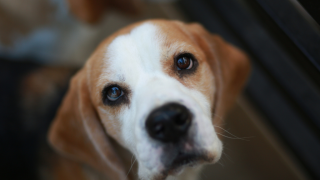
Ask your Rep to cosponsor bill
Whoever you are giving your love to this Valentine’s Day, we ask that you spare a little piece of your HEARTS for animals in laboratories.
We are calling on all U.S. citizens to ask their Representatives to support humane, animal-free science by cosponsoring the HEARTS (Humane and Existing Alternatives in Research and Testing Sciences) Act of 2025, which was reintroduced today.
The bill, sponsored by Congressmembers Ken Calvert (CA-42) and Chris Pappas (NH-1), promotes the use and development of humane, and effective alternatives to the use of animals in experiments funded by the National Institutes of Health (NIH).
You can email your Representative to tell them that they should help it to become law.
Millions of animals are forced into research experiments annually. Non-animal research and testing methods spare animals from pain, distress, and death, are increasingly more cost-effective than animal tests, and can produce reliable data that is more relevant to human health.
However, without encouragement to implement modern non-animal methods, many dogs, cats, primates, and small mammals, among others, continue to be exploited unnecessarily in painful and sometimes duplicative experiments.
The HEARTS Act directs the NIH to provide incentives to researchers to use non-animal methods whenever feasible and applicable, and establishes a dedicated center within the NIH devoted to advancing new alternative methods and developing a plan for reducing the use of animals in federally-funded research.
Congressman Calvert said, “I continue to believe that we can protect animals and taxpayers by taking steps to ensure alternatives to the use of animals in research are utilized as much as possible. The HEARTS Act is an important step to stop the unnecessary use of animals in testing and research performed by the NIH. This is a bipartisan effort and I appreciate the support of my colleague Congressman Pappas.”
Congressman Pappas said, “The NIH represents the gold standard for groundbreaking science, research, and development that improves the lives of people around the world. It should lead on advancing modern research and testing methods as well. The HEARTS Act will foster the development and use of humane, non-animal testing methods in federally funded experiments by NIH. I’m glad to once again partner with Congressman Calvert on this bipartisan legislation.”
The HEARTS Act will prioritize the use of alternatives by amending the Public Health Services Act to:
(1) establish incentives for investigators to use available non-animal methods whenever feasible and applicable.
(2) create guidelines for biomedical and behavioral research to ensure that animal testing alternatives are utilized whenever available and appropriate in proposals.
(3) ensure that proposal reviewers have access to a reference librarian with expertise in evaluating the adequacy of the search methods for alternatives described in the protocol.
(4) require that proposals be reviewed by at least one person with expertise in non-animal research methods.
(5) establish a center within the NIH to train and support scientists in the development and use of human-centered methods, and develop a plan for reducing the number of animals used in federally-funded research.
Watch a short video about the HEARTS Act:
Monica Engebretson, Head of Public Affairs North America for Cruelty Free International said: “The US National Institutes of Health is under increasing pressure to replace animal use in publicly funded research. The HEARTS Act will help advance the replacement of animals by incentivizing the use and development of non-animal methods in research proposals and ensuring that proposals are reviewed by at least one person with expertise in modern non-animal research methods help ensure that replacing the use of animals is a priority. The Act also creates a center dedicated to funding non-animal methods, tracking animal use, and developing strategies to reduce it. Accelerating the adoption of non-animal methods could enhance the cost-effectiveness of federal research investments, drive scientific innovation, lead to better therapies for human conditions, and save animal lives. Cruelty Free International is grateful for the leadership of Representatives Calvert and Pappas in sponsoring the HEARTS Act.”
U.S. residents can help advance the HEARTS Act by contacting their U.S. Representative and asking that they become a cosponsor of the bill.
